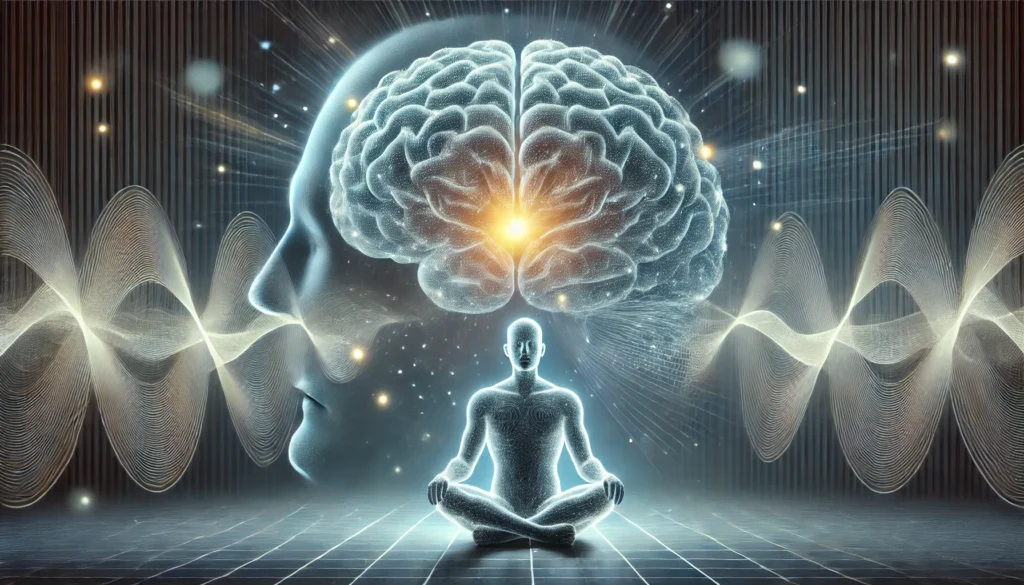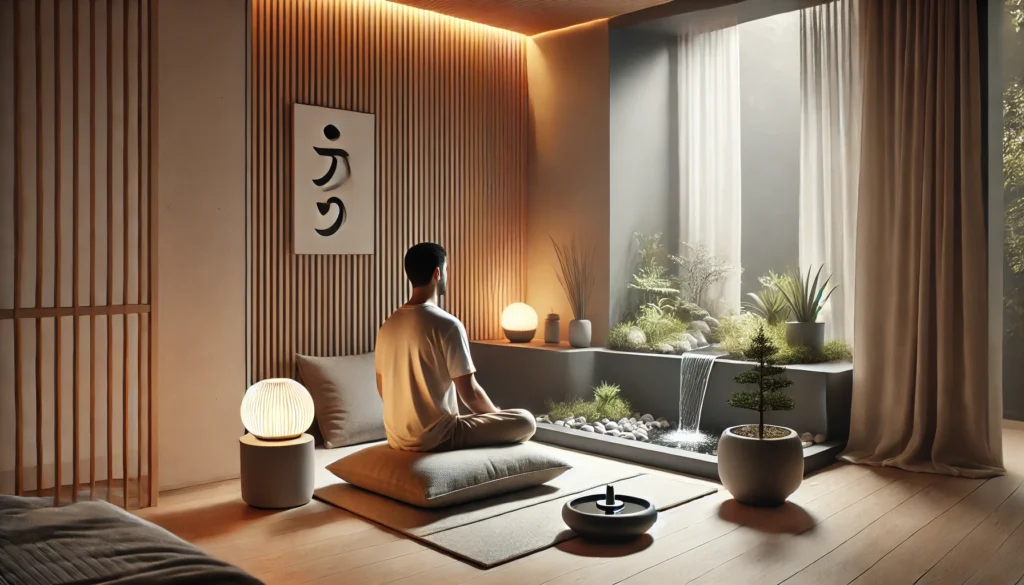In today’s fast-paced world, anxiety is an ever-present companion for many. As we navigate the complexities of modern living, our minds are often overwhelmed with stress and worry. But could the ancient practice of meditation offer a reprieve from this modern affliction? As a health and wellness expert, I invite you to explore how meditation can transform your mind and alleviate anxiety. By embracing this practice, you open the door to a world of mental clarity and emotional balance.
You may also like: Mindfulness Practices to Sharpen Your Focus
Understanding Anxiety and Its Impacts
Anxiety is a natural response to stress and a normal part of life. It acts as a protective mechanism, alerting us to potential threats and helping us prepare for challenges. However, when it becomes persistent, it can interfere with daily activities and lead to anxiety disorders. These conditions are characterized by excessive worry, fear, and nervousness, affecting both mental and physical health. Understanding the roots and manifestations of anxiety is crucial in managing it effectively.
The Science Behind Anxiety
Anxiety triggers the body’s fight-or-flight response, releasing stress hormones like cortisol and adrenaline. These hormones prepare the body to react to perceived threats, enhancing alertness and energy levels. While these hormones can enhance performance in short bursts, chronic anxiety leads to elevated levels of these hormones, which can have detrimental effects on overall health. Prolonged exposure to stress hormones can impair cognitive function, weaken the immune system, and contribute to chronic diseases.
The Emotional Toll of Anxiety
The emotional impact of anxiety can be profound, leading to feelings of isolation, frustration, and helplessness. Individuals with anxiety may experience a constant sense of dread or apprehension, making it difficult to enjoy life fully. This emotional strain can affect relationships, work performance, and overall quality of life. Recognizing these emotional challenges is the first step towards seeking effective coping strategies, such as meditation.
Anxiety and Physical Health
Anxiety doesn’t only affect the mind; it takes a toll on the body as well. Physical symptoms of anxiety can include headaches, muscle tension, fatigue, and insomnia. Over time, untreated anxiety can contribute to more serious health issues, such as heart disease, digestive problems, and autoimmune disorders. By understanding the physical manifestations of anxiety, we can better appreciate the importance of addressing it through holistic approaches like meditation.
The Power of Meditation
Meditation, an ancient practice rooted in mindfulness and concentration, has gained popularity as a tool for managing anxiety. It involves focusing the mind and eliminating the stream of jumbled thoughts that may be crowding your mind and causing stress. By cultivating a state of inner calm and awareness, meditation empowers individuals to respond to life’s challenges with greater resilience and clarity.
Can Meditation Help with Anxiety?
Research suggests that meditation can significantly reduce symptoms of anxiety. A study published in JAMA Internal Medicine found that mindfulness meditation programs showed moderate evidence of improving anxiety, depression, and pain. These findings underscore the potential of meditation as a valuable component of mental health care. Meditation encourages relaxation and mindfulness, helping to break the cycle of anxiety. By fostering a non-judgmental awareness of the present moment, meditation can help individuals let go of anxious thoughts and embrace a sense of peace.
How Does Meditation Work for Anxiety?
Meditation works by promoting a state of relaxation, which counteracts the effects of the fight-or-flight response. Regular practice increases the brain’s production of serotonin and dopamine, neurotransmitters linked to mood regulation. These chemical changes can enhance feelings of well-being and reduce anxiety symptoms. Moreover, it enhances the brain’s neuroplasticity, allowing it to adapt more effectively to stressors. By training the mind to focus and remain present, meditation can help rewire neural pathways, fostering a more positive and resilient mindset.
Different Types of Meditation for Anxiety
There are various forms of meditation, each offering unique benefits for anxiety management. Mindfulness meditation focuses on cultivating awareness of the present moment, while guided meditation uses visualizations and affirmations to promote relaxation. Transcendental meditation involves the repetition of a mantra to quiet the mind, and loving-kindness meditation encourages the development of compassion and empathy. Exploring different meditation techniques can help you find the approach that resonates best with your needs and preferences.

Historical Context and Current Trends
Meditation is not a new phenomenon. It has been practiced for thousands of years, with its origins in ancient Eastern traditions such as Buddhism and Hinduism. These traditions emphasize the cultivation of inner peace, awareness, and spiritual growth. Today, meditation is embraced worldwide, transcending cultural and religious boundaries. As modern science continues to validate its benefits, meditation is increasingly recognized as a powerful tool for mental health and well-being.
The Evolution of Meditation Practices
Over the centuries, meditation practices have evolved and diversified, adapting to the needs and beliefs of different cultures. From the contemplative practices of Christian monks to the meditative movements of Tai Chi and Qigong, meditation has taken many forms. This rich tapestry of traditions reflects the universal human quest for peace and understanding. As meditation becomes more mainstream, individuals can draw from a wide range of practices to support their mental health journey.
Meditation and Depression
While our focus is on anxiety, it’s worth noting that meditation is also beneficial for depression. Studies indicate that meditation can reduce symptoms of depression by increasing mindfulness, fostering a greater sense of well-being, and improving emotional regulation. By cultivating a non-judgmental awareness of thoughts and emotions, meditation can help individuals break free from negative thought patterns and develop a more balanced perspective. This holistic approach to mental health acknowledges the interconnectedness of anxiety and depression, offering hope for those seeking relief from both conditions.
Meditation in the Digital Age
In the digital age, meditation has found new avenues for growth and accessibility. Mobile apps, online courses, and virtual meditation communities offer individuals the opportunity to learn and practice meditation from the comfort of their homes. These digital resources provide guided sessions, mindfulness exercises, and community support, making meditation more accessible than ever before. As technology continues to evolve, the integration of meditation into daily life is likely to expand, offering new possibilities for mental health support.
Practical Steps to Meditate for Anxiety and Depression
Embarking on a meditation journey may seem daunting, but it doesn’t have to be. With patience and practice, anyone can learn to meditate and experience its transformative benefits. Here are some steps to help you get started and cultivate a meditation practice that supports your mental health.
Find a Quiet Space
Choose a quiet, comfortable space where you won’t be disturbed. This could be a dedicated meditation room or a cozy corner in your home. Creating a peaceful environment can help you relax and focus during your practice. Consider adding elements that enhance the ambiance, such as soft lighting, calming scents, or soothing music. Your meditation space should be a sanctuary that invites you to unwind and connect with your inner self.
Set a Time Limit
Start with short sessions of 5-10 minutes and gradually increase as you become more comfortable with the practice. Setting a specific time limit can help you stay committed and make meditation a regular part of your routine. As you progress, you may find that longer sessions allow for deeper relaxation and insight. Remember, consistency is more important than duration, so aim to meditate daily, even if only for a few minutes.
Focus on Your Breath
Close your eyes and take slow, deep breaths. Focus on the sensation of the air entering and leaving your body. This simple act can anchor your mind and help alleviate anxiety. Breathing deeply activates the parasympathetic nervous system, promoting relaxation and reducing stress. As you breathe, visualize tension melting away with each exhalation, leaving you feeling calm and centered.
Observe Your Thoughts
As you meditate, you’ll notice thoughts coming and going. Instead of engaging with them, observe them without judgment and gently return your focus to your breath. This practice of non-attachment helps you develop a more mindful relationship with your thoughts and emotions. Over time, you’ll learn to let go of anxious thoughts more easily, creating space for peace and clarity in your mind.
Practice Regularly
Consistency is key. Aim to meditate daily to reap the full benefits. Over time, you’ll find it easier to enter a state of calm and mindfulness. Regular practice strengthens your ability to respond to stress with equanimity and resilience. As meditation becomes a habit, you’ll discover new depths of self-awareness and emotional balance, empowering you to navigate life’s challenges with grace and confidence.

Future Implications of Meditation for Mental Health
The future of meditation in mental health is promising. As research continues to uncover its benefits, meditation may become an integral part of holistic approaches to mental health care. This shift towards a more comprehensive understanding of well-being acknowledges the importance of nurturing both mind and body.
Is Meditation Good for Anxiety?
The evidence supports that meditation is not only good for anxiety but also an effective tool for managing stress and promoting overall mental well-being. Studies have shown that regular meditation practice can lead to significant reductions in anxiety symptoms, enhancing quality of life and emotional resilience. As more people turn to meditation, it may lead to a broader acceptance of alternative therapies in mainstream healthcare. This growing recognition of meditation’s benefits is paving the way for its inclusion in therapeutic settings, offering new possibilities for mental health support.
The Role of Meditation in Preventative Health Care
As awareness of the mind-body connection grows, meditation is increasingly viewed as a preventative health measure. By promoting relaxation and reducing stress, meditation can help prevent the onset of anxiety disorders and other stress-related conditions. Incorporating meditation into daily routines can foster a proactive approach to mental health, empowering individuals to take charge of their well-being. This preventative focus aligns with the principles of holistic health care, which emphasize the importance of balance and harmony in all aspects of life.
Integrating Meditation into Traditional Therapy
Meditation is not a standalone solution but can be effectively integrated into traditional therapy approaches. Many mental health professionals now incorporate mindfulness-based interventions, such as Mindfulness-Based Stress Reduction (MBSR) and Mindfulness-Based Cognitive Therapy (MBCT), into their practice. These programs combine meditation techniques with cognitive and behavioral strategies to address anxiety and other mental health concerns. By complementing traditional therapies with meditation, individuals can access a more comprehensive and personalized approach to mental health care.
Can Meditation Cure Anxiety?
While meditation is a powerful tool, it’s important to understand that it is not a cure for anxiety. Instead, it is a complementary practice that can be used alongside other treatments, such as therapy and medication, to manage symptoms more effectively. Recognizing the limitations of meditation ensures that individuals receive the support they need for their unique circumstances.
Meditation as Part of a Holistic Treatment Plan
For individuals with anxiety disorders, a holistic treatment plan may include a combination of meditation, therapy, medication, and lifestyle changes. This multifaceted approach addresses the root causes of anxiety while providing tools for symptom management. By incorporating meditation into a broader treatment plan, individuals can enhance their capacity for self-regulation and emotional resilience. This holistic perspective acknowledges the complexity of mental health and the need for diverse strategies to support healing and growth.
The Importance of Professional Guidance
While meditation can be a valuable tool for anxiety management, it is essential to seek professional guidance when dealing with severe anxiety or mental health disorders. Mental health professionals can provide tailored recommendations and support, ensuring that meditation is used safely and effectively. By working with a qualified practitioner, individuals can explore meditation as part of a comprehensive treatment plan, gaining insights and strategies that support their well-being.
Personalizing Your Meditation Practice
Every individual’s experience with anxiety is unique, and so too is their journey with meditation. Personalizing your meditation practice involves exploring different techniques, durations, and settings to find what works best for you. Experimenting with various approaches allows you to tailor your practice to meet your specific needs and goals. By embracing this flexibility, you can create a meditation routine that is both enjoyable and effective, supporting your mental health journey with compassion and creativity.

Conclusion: Transform Your Mind
Meditation offers a sanctuary of peace and mindfulness in a world filled with chaos. By incorporating meditation into your daily routine, you can transform your mind, find relief from anxiety, and enhance your mental health. Whether you’re a health and wellness coach, a science journalist, or a biohacker, meditation provides a valuable tool in the pursuit of mental clarity and emotional well-being.
With its rich historical roots and growing body of scientific evidence, meditation stands as a testament to the power of the mind. It invites us to explore the depths of our consciousness, fostering a greater understanding of ourselves and the world around us. So why wait? Begin your meditation journey today and unlock the transformative potential within you. Embrace the practice with an open heart, and discover the profound peace and resilience that meditation can bring to your life.
Further Reading:
Can Meditation Really Reduce Anxiety? What Experts Want You to Know
Important Note: The information contained in this article is for general informational purposes only, and should not be construed as health or medical advice, nor is it intended to diagnose, prevent, treat, or cure any disease or health condition. Before embarking on any diet, fitness regimen, or program of nutritional supplementation, it is advisable to consult your healthcare professional in order to determine its safety and probable efficacy in terms of your individual state of health.
Regarding Nutritional Supplements Or Other Non-Prescription Health Products: If any nutritional supplements or other non-prescription health products are mentioned in the foregoing article, any claims or statements made about them have not been evaluated by the U.S. Food and Drug Administration, and such nutritional supplements or other health products are not intended to diagnose, treat, cure, or prevent any disease.


